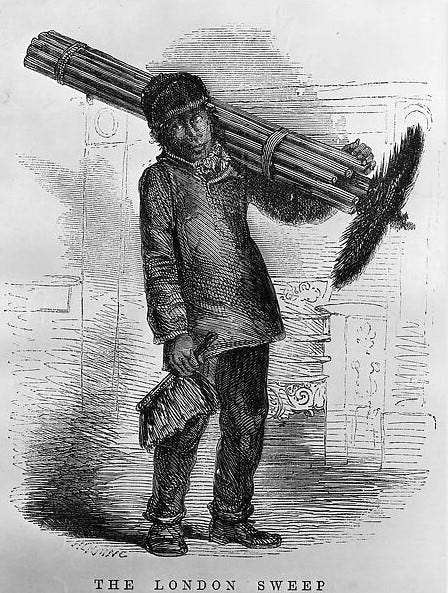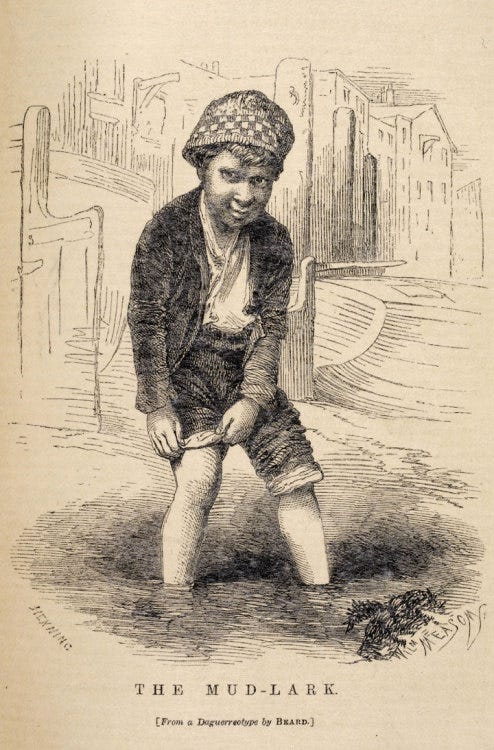Readers must pardon my recent absence. Taking a brief sojourn abroad, I consciously decided not to take my laptop, instead deciding to be old fashioned and to read a book. No doubt I will get to poking fun at the hollow suits’ electioneering soon, but given that we have five years of Labour government ahead of us there is surely ample time for all that.
Having been sat on my bookshelf for only the last fifteen years or so, I finally got around to reading Mayhew’s London Labour and the London Poor while away. In this work, journalist Henry Mayhew documents the world inhabited by our capital’s poorest souls in the 1840s.
It was one of the first social histories that attempts to present an objective view of those occupying society’s lowest rungs. The rag-and-bone men, the costermongers, the mudlarks. The latter, who spent their days dredging through the mud of the Thames’ banks to find things to sell, were still a rung above those whose occupation it was to find ‘pure’ (dog muck) to sell to tanneries, and ‘toshers’ – those who scavenged in London’s sewers.
The book, originally serialised in the Morning Chronicle, represented a moment where, for the briefest moment, such people could appear out of history’s mists before retreating back into obscurity. For most of the past, these people’s words, thoughts and deeds went unrecorded.
They were not those whose each action was salivated over by historians – the Napoleons or Wellingtons of the period – but they were people nevertheless. Later social historians, trying to counterbalance the ‘great man’ tendency of history, regarded them as a mass, useful in the final reckoning by their ability to be conscripted into one political ideology or another.
What, for example, happened to the eight-year-old girl who spent her days selling watercress at Farringdon market? We will never know. We know only that her mother pulled her out of school after the girl was beaten by her headmaster – a cane across the face – and she spent some of her own childhood rearing an infant relative.
In a world where people infantilise themselves incessantly – witness the hideous spectacle of adults wetting themselves at the prospect of another permutation Star Wars or Harry Potter – it is difficult to imagine an eight-year-old who claims “I ain’t a child”, who can neither read nor write, and yet has acquired some business acumen hawking wears on the street.
Those complaining of modern hardships, for example the use of one of their ow-ow words, would be well advised to consider their relatively blessed condition.

Most of us are descended from people of such a class: if not of the urban poor, then at least the rural worker. It is only through the blessings of their industriousness and the inventiveness of our ancestors that we have been pulled out of such a general state of misery, and where the workmen’s cottage of yesteryear can become the ‘des res’ of today.
A common lie is that our emergence out of the general state of history – one of poverty and hardship – was on the back of slavery. This is a simple argument to swat away like some fattened, filthy fly. Each civilisation before us engaged in the trading of humans, and yet every one of them failed to modernise. As such, our own historical success cannot be based upon that same practice.
Not, however, that this is enough to halt the permitted (nay, actively encouraged) hatred of Europeans and their New World offshoots. The African who sold African into slavery gets off Scot-free, as does the white-slave-owning Berber, for whom Europeans served in slave-galleys and elsewhere died in the construction of their petty palaces.
It is more accurate to say that, in Britain at least, our uniqueness lies in our hatred of the practice of slavery, and its eventual abolition. This is not to assert that our nation has a faultless past – to do so would be to entertain a child’s version of history.
Yet, it appears that it is only the West who can do wrong, and only white people who can carry historical guilt. It does not matter that we are the descendants of those who toiled in the mines or the mill, or that our nation abolished slavery. Those who want to destroy the West use simplistic, childlike arguments against which we – heaven knows why – have little defence. Sensing this weakness, they continue on the attack.
We have become a culture that defers automatically to criticism. In some way, this betrays a civilisational strength: we are reflective by nature. As such, our tendency is to wonder whether harsh words have any merit and could lead to our own betterment.
Instead, with a withered backbone, it has now become a reflex to cede ground the moment anyone says ‘white man bad’. Compare this to the reaction of other cultures, which, when criticised, may result in your head being chopped off.
That is fine to insult and admonish the native inhabitant of the West is beyond doubt. To take one example out of a billion, Labour’s candidate in Clacton for the upcoming general election once stated that ‘white man tears’ were his ‘favourite drink’.
It is quite literally inconceivable to imagine any other self-respecting country that would permit such a thing. Go to China and tell them you relish the tears of the Han and see how far you get. We are truly a debased, cowardly people.
Add this to the sundry other insults suffered by the British for their generosity in opening their borders, and it is not hard to see why a pervading sense of annoyance is beginning to brew.
Nor are we alone in this. It is a delight to see the European Union turning right: the metropolitan dreams of clueless Anglos who view the continent as a playground of wine, cheese and welfarism going up in smoke amid the flames of an increasingly angry populace.
And who can blame them? For some reason it is dubbed ‘populist’ to rail against your own country becoming unrecognisable, against the continual insults delivered by those so recently making our countries their home. I think, rather, it is ‘common sense’.
When you next inevitably hear some pontificating ideologue doing down your nation’s history and your culture, tell them to get stuffed. Our (until recently) blessed state was attained on the sweat of our ancestors’ brows and through our people’s creativity. Let us not shy away from facts about which we should be rightly proud.
If they don’t agree, that is fine. They are under no obligation to remain here: for the white liberal there is paradise in somewhere like Malmo (just be sure they take their flak jacket); for those whom the UK is their adopted home, they are free to leave.
Perhaps such a line of argument is overly simplistic. Yet, having been beaten around the head for year-upon-year with such similarly basic lines of attack, it might be the only thing left that will work.
There’s not that much time left. It is high time we started talking plainly.




"A common lie is that our emergence out of the general state of history – one of poverty and hardship – was on the back of slavery. This is a simple argument to swat away like some fattened, filthy fly. Each civilisation before us engaged in the trading of humans, and yet every one of them failed to modernise. As such, our own historical success cannot be based upon that same practice."
Absolutely well said. And the crazed notion that those descended from the London poor and the other poor of Victorian England should pay reparations to the descendants of Nigerian and other African princes can be seen for the perverse absurdity that it is.
Was it a good book? Worth reading? I have occasionally eyed it up in old bookshops.
Those poverty-stricken ancestors wouldn't recognise their descendants! My waitress niece of 30 lost her job due to the lockdowns. Did she starve? Was she evicted from her home? Of course not. Does she have a "mental health issue" which requires her to be handled gently in conversation and now to take anti-depressants? Of course. Does she have any clue about the past? Of course not - she wants to be a cool black dude not a descendant of racist slavers (even though her ancestors were poor working class people who never went to the seaside let alone to the colonies!).